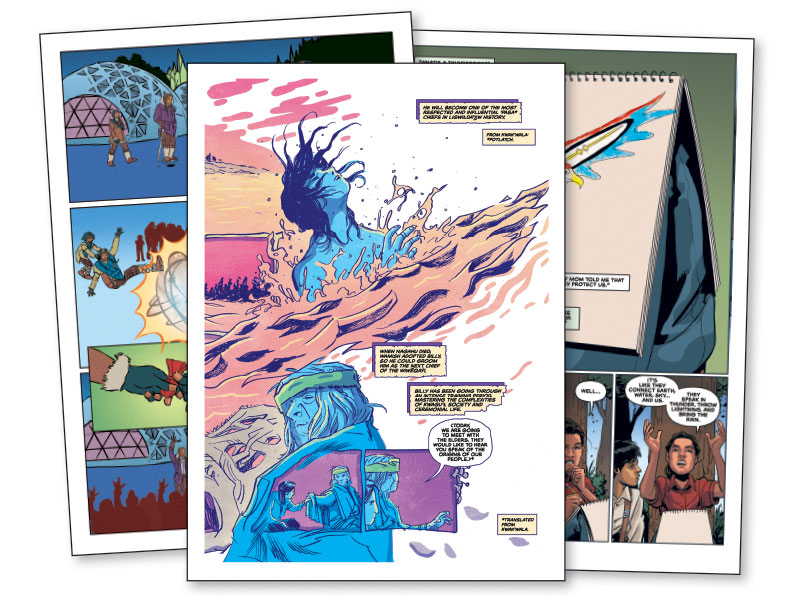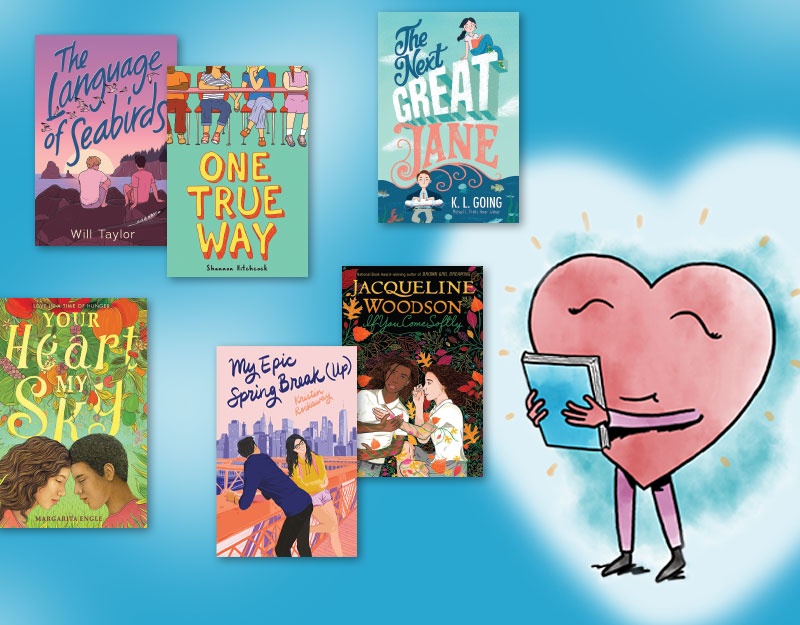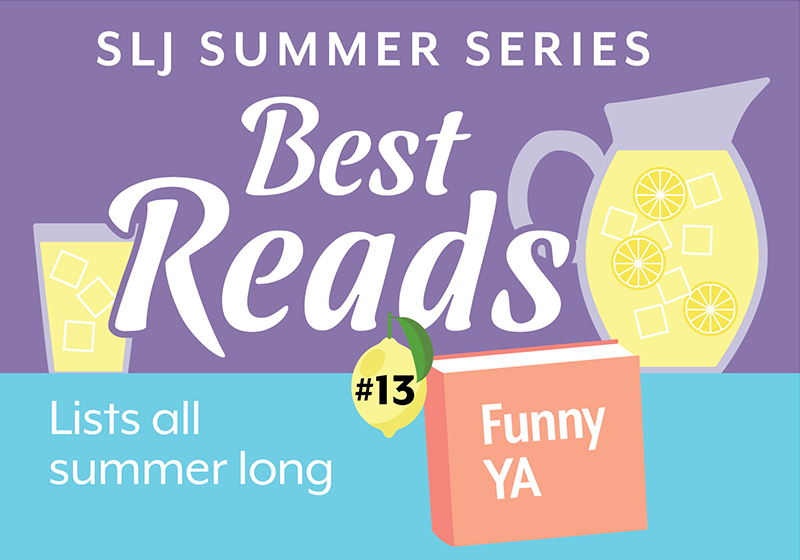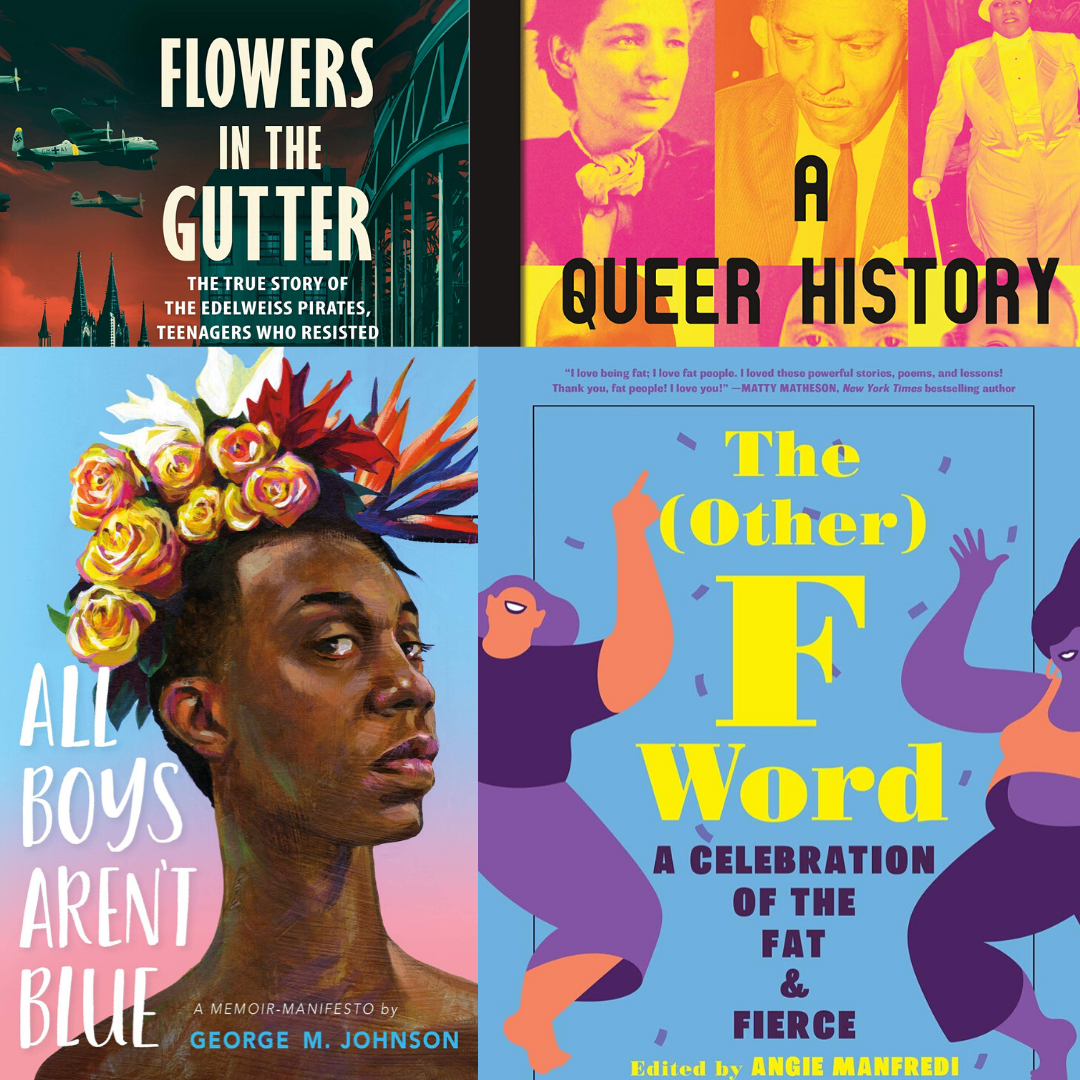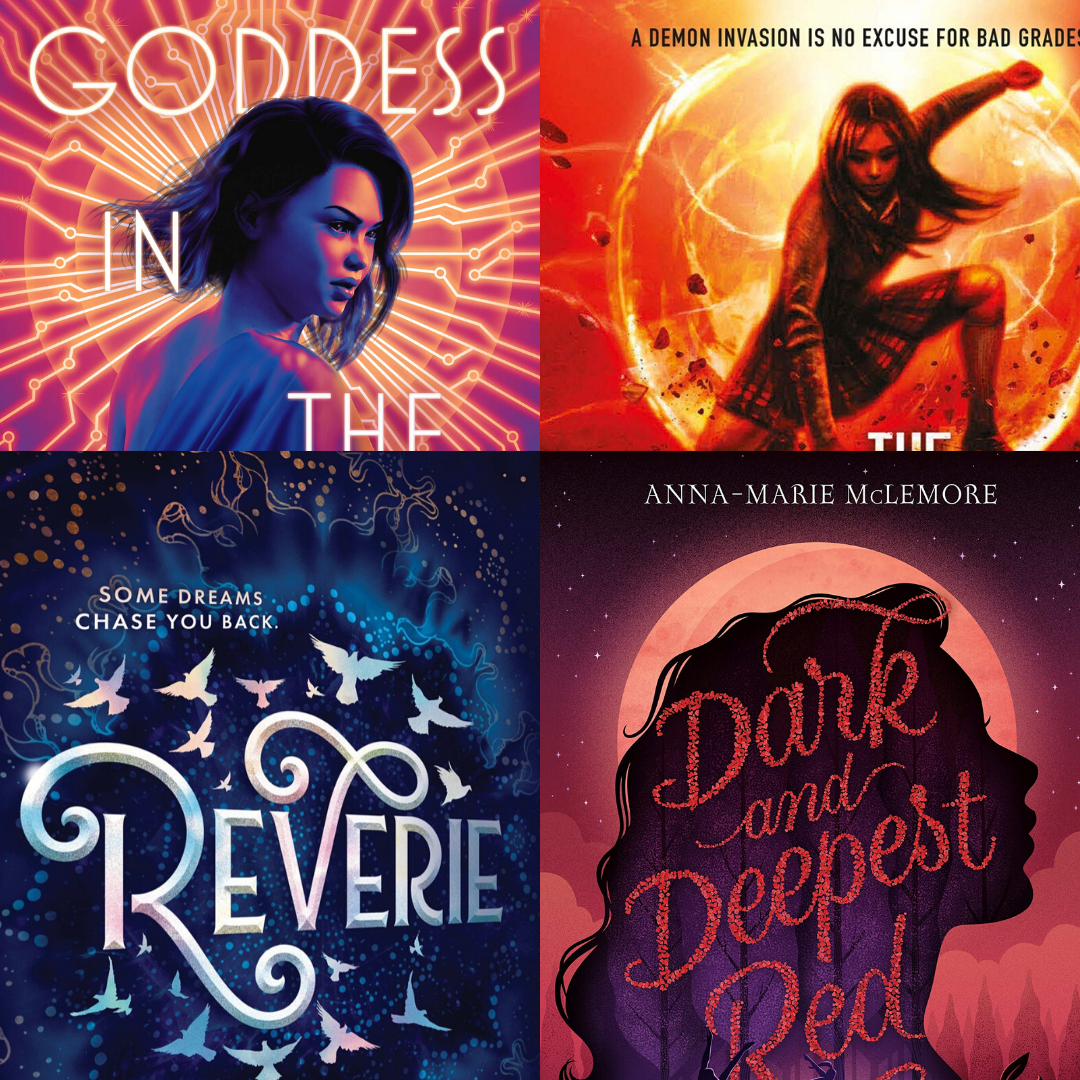Powerful Reads for the Age of Climate Anxiety, a guest post by Lauren Yero and Cliff Lewis

Millions of North American kids just kicked off their summer vacations cooped up indoors—sheltering in place from historic plumes of wildfire smoke and record-breaking heat. So it should come as no surprise that today’s young people are more anxious about the climate crisis than any generation before them. Climate anxiety is real, it’s serious, and it’s on the rise—especially in teens and young adults.
Climate anxiety isn’t a medical condition or an illness to be treated but rather a logical response to the state of our world. In 2021, the Lancet released a study on climate anxiety in young people (aged 16-25), reporting that 59% of respondents across all countries were extremely worried about climate change. Over half said they felt “sad, anxious, angry, powerless, helpless, and guilty.” Many reported feeling betrayed by people in positions of power.
ADVERTISEMENT
ADVERTISEMENT

As authors of young adult (Under This Forgetful Sky) and middle grade (We the Future) novels, we chose to confront this planetary crisis through stories. Under This Forgetful Sky, for example, is set in a near-future world that’s been radically reshaped by climate change. Clean water is scarce, rising seas and melting snowpack alter the landscape, and most everyone lives with an ever-present sense of uncertainty. It’s not a hopeless world—there’s still room for beauty and community and joy—but life is difficult, to say the least. This is the world that science says we’re headed for if we don’t make rapid, dramatic changes. It’s the world many young people see as their future. And it’s making them very anxious.
The good news is that there are ways to mitigate the emotional distress of such anxiety. We think that giving teens and young adults the space to openly share their fears about the fate of the planet could be the first step toward alleviating these fears.
The life story of climate activist Greta Thunberg bears this out. After learning about the climate crisis, she fell into a deep depression, refusing to eat or speak. But later, after famously committing herself to the work of climate activism, Greta found friendship—which she considers to be the best outcome of her work so far. A 2022 study from Current Psychology found that when young people connect with others and engage in collective climate action, their climate anxiety may be less likely to create “feelings of sadness and hopelessness that would be consistent with major depression.”
So what does all this have to do with teachers and librarians? Educators have the uncommon opportunity to hold space for students to explore their big questions, sort out their feelings, and find their ways into communities where they can manage their fears. We think that the literature classroom and the library bookshelf are the perfect places to begin such exploration.

The magic of literature is that it lets readers hold multiple points of view in their minds at once. It asks readers to put themselves into other perspectives, to imagine themselves in different experiences, different scenarios, different worlds. We the Future, for example, mirrors the experience of Greta Thunberg with a narrative centered on a boy who is wracked with climate anxiety until a girl from the year 2100 arrives in the present and teaches him the power of political organizing.
Perhaps most importantly, literature appeals to readers’ hearts, not just their minds–providing what science writer and scholar Britt Wray, in her book Generation Dread: Finding Purpose in an Age of Climate Crisis, calls “imagination amidst uncertainty.”
There are obstacles, of course, to bringing such a politically fraught topic into classrooms. The Kutztown Area School District in Pennsylvania, for example, recently opted to cancel a grant-funded program that would’ve given hundreds of students a free copy of the widely beloved middle grade novel Two Degrees by New York Times-bestselling author Alan Gratz simply because the novel, a page-turning thriller about four American kids surviving natural disasters, vividly dramatizes the impacts of climate change. Many objections to the novel centered on the question of whether it would cause undue emotional distress for students.

We asked Alan Gratz to share his thoughts on how climate-engaged literature could actually help students already struggling with climate anxiety. “I knew I was walking a fine line when I wrote a book about kids surviving contemporary climate disasters—am I educating kids on what’s going on, or am I just scaring them? Because it is scary,” Gratz says. “But as I say in the book, if the bad news is that humans are causing climate change, the good news is that humans are causing climate change. That means it’s within our power to fix it.” Gratz adds that this is why he concludes Two Degrees at a climate rally. “That, I think, is the way to combat the overwhelming hopelessness a lot of young people feel about climate change—through community action [they can] learn new tools for combating both climate change and their anxiety about it.”
And how can educators incorporate discussions of climate-engaged literature into their classrooms? According to Gratz, “climate change is the active story of our past, present, and future, and should be a core part of every school’s curriculum.” He adds that climate fiction is a perfect opportunity for cross-curricular studies. For example, he says that Language Arts classes can build empathy through books “that put faces and names to people experiencing climate change,” while also strengthening connections with Math, Science, History, and Art classes, helping students better understand the complex, interdisciplinary nature of the climate crisis.

Fortunately, we’re entering a golden age of climate-engaged literature for young people. Climate fiction (or “cli-fi”) for young adults now spans a spectrum of styles and genres—from contemporary realistic novels like The Summer We Turned Green (William Sutcliffe); to fantasy like Monsters Born and Made (Tanvi Berwah) and The Nature of Witches (Rachel Griffin); to futuristic speculative fiction like The Ones We’re Meant to Find (Joan He), Ship Breaker (Paolo Bacigalupi), War Girls (Tochi Onyebuchi) and Under This Forgetful Sky (Lauren Yero).
In the middle grade space, there are speculative adventure stories of youth climate activism like We The Future (Cliff Lewis), eco-thrillers like Two Degrees (Alan Gratz), and contemporary realistic novels like Haven Jacobs Saves the Planet (Barbara Dee) and The First Rule of Climate Club (Carrie Firestone).
These cli-fi novels are not morality tales or “issues” books but are instead complex, exciting, character-driven stories that capture the imagination, asking readers to grapple with the difficult questions that face us in a climate-changed world.
There’s no question that today’s young people are more climate-anxious than any generation that came before them, and for good reason. As writers and educators, we owe these young people a chance to express those feelings, find community, and take action to protect their future—because they have every right to defend what’s theirs.
Meet the authors

Cliff Lewis is the author of We the Future, a middle grade time-heist about climate activism, friendship, and a screaming goat who sounds exactly like Chewbacca. In his spare time, Cliff volunteers for local progressive organizations, which once led to a crew of young climate activists devouring all of his family’s traditional election-day chili.

Lauren Yero is a Cuban American writer and teacher living in the mountains of Western North Carolina. She writes speculative, near-future stories of resistance, adventure, and first love that question the structures our world is built upon. Her desire to connect more deeply with her Cuban roots led her to study and work throughout the Spanish-speaking world—including Chile, where she drew inspiration for her debut novel Under This Forgetful Sky.
About Under This Forgetful Sky by Lauren Yero
This “heartbreaking and heartfelt” (Kirkus Reviews, starred review) star-crossed love story follows two teens in a starkly unequal future world who are struggling to find their places.
ADVERTISEMENT
ADVERTISEMENT
Sixteen-year-old Rumi Sabzwari has spent his entire life behind the armored walls of St. Iago, which protect citizens of the Union of Upper Cities from the outside world’s environmental devastation. But when rebels infect his father with a fatal virus, Rumi escapes St. Iago, desperate to find a cure.
In the ruined city of Paraíso, Rumi meets fifteen-year-old Paz, who agrees to guide him on his journey. As they travel together, Rumi finds himself drawn to Paz—and behind her tough exterior, she begins to feel the same way. But Paz knows more about Rumi’s father’s illness than she’s saying and has her own agenda. With the powerful forces at play in their cities putting them at odds, can the two learn to trust in each other—enough to imagine a different world?
ISBN-13: 9781665913799
Publisher: Atheneum Books for Young Readers
Publication date: 07/18/2023
Age Range: 14 – 18 Years
About We the Future by Cliff Lewis
I’m from the future. We need you.
Ever since he learned about climate change, twelve-year-old Jonah has dreaded a weather-beaten future where not even his asthma medication can save him. Luckily, a girl from that future arrives just in time to throw Jonah a lifeline.
Sunny traveled back to the 2020s with a mission: help Jonah launch a climate strike big enough to rewrite history. To do it, he’ll have to recruit his entire school before Halloween. Why so soon? Sunny won’t say. But how can Jonah win over 600 classmates when the only thing he dreads more than the end of the world is talking to other kids?
ISBN-13: 9781631636967
Publisher: North Star Editions
Publication date: 04/18/2023
Age Range: 8 – 13 Years
Filed under: Guest Post
About Amanda MacGregor
Amanda MacGregor works in an elementary library, loves dogs, and can be found on Twitter @CiteSomething.
ADVERTISEMENT
ADVERTISEMENT
SLJ Blog Network
Endangered Series #30: Nancy Drew
Research and Wishes: A Q&A with Nedda Lewers About Daughters of the Lamp
Cat Out of Water | Review
ADVERTISEMENT



